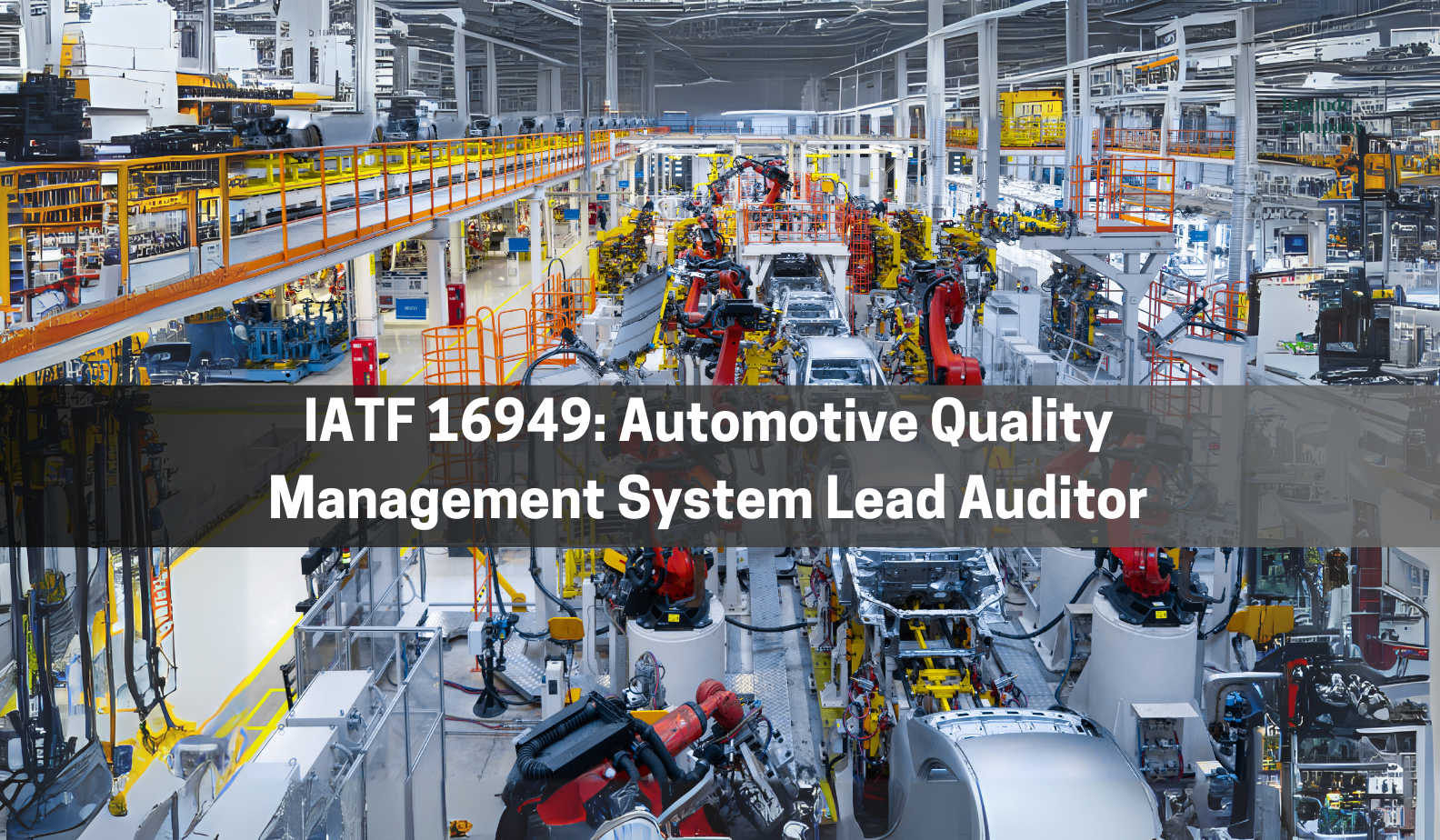
IATF 16949 Automotive Quality Management System Lead Auditor
- Industry-Specific Knowledge: Gain an in-depth understanding of automotive-specific quality management standards.
- Global Recognition: Earn a Lead Auditor certification recognized by automotive organizations worldwide.
- Career Growth: Open pathways to advanced roles in quality assurance, auditing, and automotive compliance.
- Practical Skills: Learn to identify non-conformities, lead audit teams, and implement corrective actions effectively.
- Improved Processes: Contribute to enhancing efficiency and quality across the automotive supply chain.
- Understand the structure, requirements, and principles of IATF 16949.
- Plan, perform, and manage IATF 16949 audits to assess compliance with automotive QMS requirements.
- Identify gaps in automotive processes and recommend corrective actions to ensure continual improvement.
- Integrate risk-based thinking and process improvement strategies into quality audits.
- Lead audit teams effectively while ensuring compliance with ethical auditing standards.
- Develop and present detailed audit reports to stakeholders.
- Introduction to Automotive QMS and IATF 16949
- Understanding the evolution and importance of IATF 16949.
- Benefits of implementing IATF 16949 in automotive manufacturing.
- IATF 16949 Requirements
- Detailed analysis of the standard’s clauses.
- Key focus areas: defect prevention, risk management, and process efficiency.
- Audit Process and Methodology
- Planning, conducting, and reporting audits in the automotive sector.
- Techniques for effective data collection and process analysis.
- Auditor’s Competencies and Responsibilities
- Managing ethical dilemmas and ensuring audit integrity.
- Building and leading audit teams for maximum efficiency.
- Non-Conformities and Corrective Actions
- Identifying and categorizing non-conformities.
- Developing and verifying corrective action plans.
- Certification Process
- Steps to achieve and maintain IATF 16949 certification.
- Preparing for follow-up audits and re-certification.
- Risk-Based Thinking and Process Improvement
- Applying risk management principles to automotive quality processes.
- Continuous monitoring and improvement strategies.
- Practical Application
- Role-playing scenarios and case studies to simulate audit environments.
- Group discussions and interactive exercises for skill enhancement.
- Advanced Certifications
- Expand your expertise with ISO 14001 Environmental Management System or ISO 45001 Occupational Health and Safety Management System certifications.
- Consulting Roles
- Provide guidance to automotive organizations on implementing and maintaining IATF 16949 standards.
- Quality Management Positions
- Advance to roles such as Quality Assurance Manager or Automotive Quality Director in leading companies.
- Specialized Auditing Roles
- Focus on specific areas like supplier audits, risk management, or process improvement within the automotive industry.
- Professional Development
- Join industry bodies like the International Automotive Task Force (IATF) for networking and knowledge sharing.
- Further Skills Development
- Pursue Lean Six Sigma certifications to enhance process improvement expertise.
- Expert Trainers: Learn from professionals with extensive automotive industry experience.
- Practical Learning: Engage in real-world case studies, role-playing, and exercises tailored to the automotive sector.
- Recognized Certification: Earn a globally acknowledged Lead Auditor certification upon successful completion.
- Comprehensive Resources: Access up-to-date materials and templates designed for IATF 16949 audits.
- Ongoing Support: Benefit from post-course guidance and resources to enhance your career trajectory.
Study Units
- Introduction to IATF 16949
- Overview of IATF 16949 and its relevance in the automotive industry.
- Integration of ISO 9001 requirements and sector-specific standards.
- Auditor Roles and Responsibilities
- Ethical practices, competencies, and responsibilities of Lead Auditors.
- Managing audit teams and ensuring successful audit execution.
- Key Requirements of IATF 16949
- Core clauses of the IATF 16949 standard.
- Automotive-specific requirements, including risk management and defect prevention.
- Audit Planning and Preparation
- Developing effective audit plans and defining objectives.
- Preparing audit checklists and determining resource requirements.
- Conducting Audits
- Gathering evidence through interviews, observations, and documentation review.
- Identifying non-conformities and areas for improvement.
- Audit Reporting and Follow-Up
- Writing detailed audit reports and presenting findings.
- Recommending corrective actions and verifying their implementation.
- Continual Improvement in Automotive QMS
- Strategies for process improvement and maintaining compliance.
- The role of risk-based thinking in automotive quality management.
- Case Studies and Practical Exercises
- Real-world examples of IATF 16949 audits.
- Hands-on exercises in identifying non-conformities and proposing solutions.
Upon successful completion of this course, participants will be able to demonstrate the following professional competencies:
Audit Leadership:
Lead IATF 16949 audits effectively, ensuring compliance with ISO 19011 and IATF auditing guidelines.Automotive Process Evaluation:
Assess the effectiveness of automotive processes, including production, quality control, and supply chain management.Risk-Based Thinking:
Apply risk management and preventive action principles throughout the audit process to minimize defects and improve reliability.Compliance Assessment:
Evaluate conformance to IATF 16949, ISO 9001, and customer-specific automotive requirements.Non-Conformance and Corrective Action:
Identify process deviations, perform root cause analysis, and recommend effective corrective and preventive measures.Audit Reporting and Communication:
Prepare and present structured, evidence-based audit reports to management and stakeholders.Continuous Improvement Facilitation:
Promote continual improvement initiatives within automotive manufacturing and service processes.Team and Stakeholder Coordination:
Lead audit teams efficiently and foster collaboration across departments and supplier networks.Integration Capability:
Integrate IATF 16949 audits with related standards (ISO 9001, ISO 14001, ISO 45001) for holistic quality management.
This course is tailored for professionals working in or with the automotive industry who aim to enhance their expertise in auditing and improving quality management systems in line with the IATF 16949 standard. It is ideal for:
Quality Managers and Engineers: Seeking to develop in-depth knowledge of automotive QMS standards and lead internal or external audits.
Internal and External Auditors: Aiming to become certified Lead Auditors for IATF 16949-compliant quality systems.
Production and Process Managers: Focused on improving operational efficiency, defect prevention, and risk management.
Supplier Quality Professionals: Responsible for ensuring supplier compliance with IATF 16949 and customer-specific requirements.
Consultants and Quality Advisors: Supporting organizations in achieving and maintaining IATF 16949 certification.
Automotive Compliance Officers: Managing conformity and continuous improvement within manufacturing and supply chain operations.
Professionals Pursuing Career Advancement: Aspiring to leadership positions in automotive quality, auditing, or compliance management.
Our assessment process is designed to ensure every learner achieves the required level of knowledge, skills, and understanding outlined in each course unit.
Purpose of Assessment
Assessment helps measure how well a learner has met the learning outcomes. It ensures consistency, quality, and fairness across all learners.
What Learners Need to Do
Learners must provide clear evidence that shows they have met all the learning outcomes and assessment criteria for each unit. This evidence can take different forms depending on the course and type of learning.
Types of Acceptable Evidence
Assignments, reports, or projects
Worksheets or written tasks
Portfolios of practical work
Answers to oral or written questions
Test or exam papers
Understanding the Structure
Learning outcomes explain what learners should know, understand, or be able to do.
Assessment criteria set the standard learners must meet to achieve each learning outcome.
Assessment Guidelines
All assessment must be authentic, current, and relevant to the unit.
Evidence must match each assessment criterion clearly.
Plagiarism or copied work is not accepted.
All learners must complete assessments within the given timelines.
Where applicable, assessments may be reviewed or verified by internal or external quality assurers.
Full learning outcomes and assessment criteria for each qualification are available from page 8 of the course handbook.
Top Courses
Related Courses
Let's Get in touch
Deleting Course Review
Course Access
This course is password protected. To access it please enter your password below:

